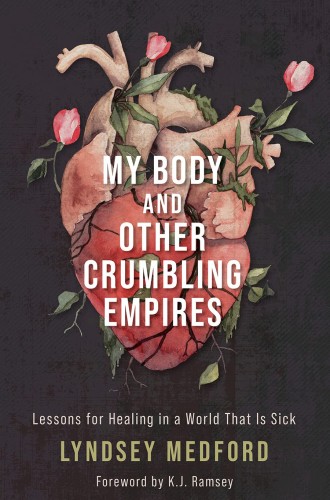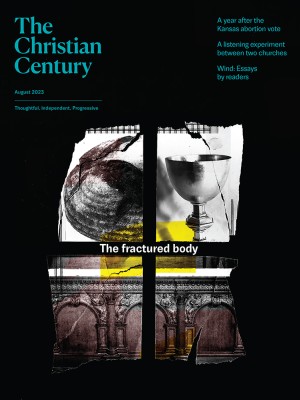When a culture’s immune system is compromised
Lyndsey Medford’s beautiful new book looks to interconnectedness amid the diseases of capitalism and injustice.
More than three years into a global pandemic, it feels almost cliché to suggest that COVID has changed everything about the world. Such a claim might be met in some quarters with deep eye rolls and the insistence that nothing much has changed at all. But many people—those who are immunocompromised, for example, and those with disabilities—must still remain cautious, knowing that a bout of COVID could mean severe illness, even death.
For writer and activist Lyndsey Medford, the pandemic has meant isolation and a reckoning with her own diagnosis of a chronic autoimmune illness. Having navigated a broken health-care system with a body that the abled might likewise consider broken, Medford recognizes well how others’ actions can affect her own well-being. She knows that our interconnectedness matters deeply and that we can be made whole—emotionally, spiritually, and physically—only “when we experience relationships that are radically for the flourishing of others.”
Read our latest issue or browse back issues.
In her beautiful new book, Medford challenges readers to see how the interconnected systems of consumerism, capitalism, and individualism have separated us from each other and from ourselves. Using the extended metaphor of an immune system, Medford argues that when our immunity is compromised, everything can go haywire. Our “crumbling empires” are in need of healing: both in the short term, with “emergency action to lessen the distress,” and also in the long term, with fixes to repair our broken systems and allow us all to be made well.
In 1999, Medford’s pediatrician diagnosed her with Behcet’s syndrome, a rare autoimmune disorder that causes blood vessels to inflame, leading to symptoms like arthritis, skin ulcers, and mouth sores. At times, Medford’s disorder has been in remission, but flares and the fear of them have compelled her to reorder her life, beginning with her relationship to her own body. After years of treating her body as a foreign object to be controlled, Medford has worked out a new approach: encountering her body as a “sacred space.” Her book powerfully challenges readers to do the same.
Medford refers to her body as “her” rather than “it,” one way she honors the sacredness of the embodied self. She rightfully notes how many of us abuse our bodies in service to capitalism. We work when we are ill instead of resting to allow for healing. We worship at the altar of the wellness industry, buying goods that promise to make us thinner, prettier, and thus more worthy. We embrace the approach of the Western medical system, which often treats particular symptoms without taking a holistic approach to healing.
That medical system is also a crumbling empire, at least in the United States. Medford considers “American healthcare” an oxymoron, noting that it is far less about health and care than about profit. Hyper-specialization in medicine requires us to go to a different doctor for each symptom, further bifurcating a body in search of wholeness. The difficulty of navigating health-care systems exposes at each turn how those with power and privilege receive treatment not available to those on the margins. The pandemic has been a stark reminder that an unjust health-care system affects us all. Although Black, Brown, and Indigenous people, those who are poor, and the elderly were inordinately impacted by the virus, health care for everyone was compromised: burdened hospitals treating very ill patients put everyone at risk of not receiving treatment for other ailments, including heart attacks, strokes, and injuries from car accidents.
This idea of our interconnectedness is central to Medford’s view of healing and wholeness. She asks us to reconsider what it means to be made well, noting that healing does not entail bodily perfection—a mythology perpetuated by capitalism—but something else entirely. Wholeness requires being in right relationship with others, with the planet, and with bodies—our own and those of others. Medford notes that our society has “made bodies into sites of exclusion, injustice, othering, and oppression. Those with Black, Brown, Indigenous, and other bodies of color, queer and trans bodies, disabled bodies, women’s bodies, fat bodies, and more must often find ways to welcome and embrace ourselves and each other precisely because the wider world has marked our bodies as different, exploitable, or expendable.” Finding space to embrace and celebrate the bodies around us demands that we rewrite mythologies that say productivity matters more than presence, efficiency more than integrity, competition more than compassion.
For Medford, wholeness doesn’t necessarily mean healing in the traditional sense—the blind able to see, the wheelchair user walking unassisted. We tend to promote such examples of healing from the Gospels, because they reinforce our sense of what healing should be. But Jesus “felt no compunction to fix anyone,” Medford writes. He brought into his “weird little community” tax collectors and fishermen, the wealthy and the poor, Pharisees and the unreligious—all of whom coalesced around difference and around Jesus’ radical idea of love. His example of restoring the excluded and outcast to community, Medford claims, is the true miracle of healing, the one to which we should be committing our lives.
We are, all of us, living in crumbling empires—both that of our bodies and that of a sickened world. Medford notes in her introduction that more than 60 percent of adults in the United States suffer from some kind of chronic illness. Given the vagaries of aging, most of us will experience disability at some point, if we are lucky to live long enough. The center cannot hold, and the systems many of us put our trust in—capitalism, religious institutions, democracy—are also eroding, or were never robust to begin with.
Medford’s excellent book offers a hope-filled map toward healing, beginning with the acknowledgment that “we are interdependent down to our very being.” In the midst of our crumbling empires, we are called to restoration. This begins with dismantling the systems that separate us from each other and from ourselves. In our connectedness we will find wholeness, including the “love and joy, pleasure, connection, and even peace,” that creates the beloved community.







